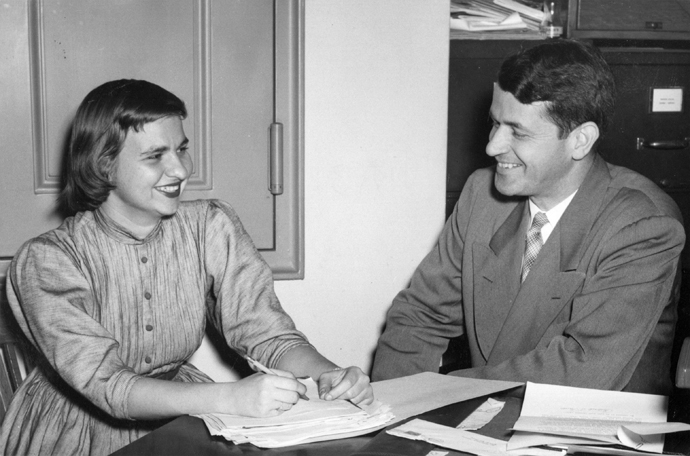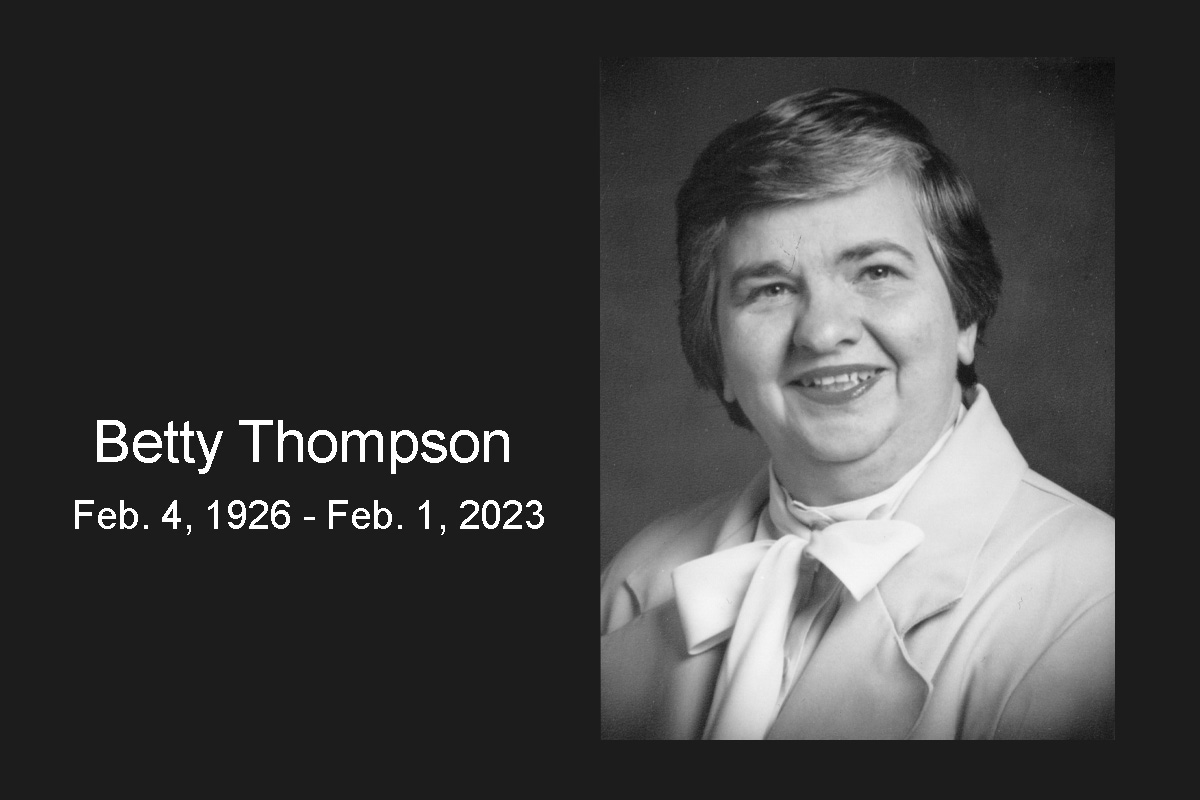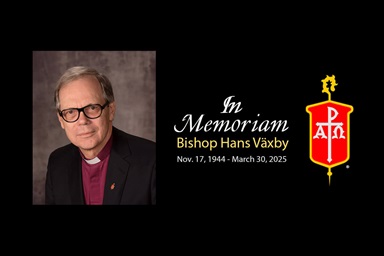Key points:
- A longtime Global Ministries executive who also worked for the World Council of Churches, Betty Thompson was a force in religious journalism.
- Thompson died Feb. 1 in New York City, a few days before her 97th birthday.
- The United Methodist Association of Communicators recognized Thompson’s contributions by naming her as Communicator of the Year in 1994 and a member of the association’s Hall of Fame in 2001.
- She actively participated in five WCC assemblies — beginning with New Delhi in 1961 and ending with Canberra, Australia, in 1991.
The ecumenical movement of the mid-20th century helped chart a path for Betty Thompson and she, in turn, helped tell the story of Christianity’s impact on the world.
Along the way, she set high standards for journalistic integrity in religious communications and championed young talent, often acting as a mentor.
Thompson — who served as a communications executive at the United Methodist Board of Global Ministries for many years — died Feb. 1 in New York City, a few days before her 97th birthday.
The United Methodist Association of Communicators recognized Thompson’s contributions by naming her as Communicator of the Year in 1994 and a member of the association’s Hall of Fame in 2001.
Tom McAnally, retired director of United Methodist News Service, remembered Thompson as a skilled writer and communicator with a passion for the church’s worldwide mission.
“Many of us considered her the ‘go-to’ person for counsel and information regarding the connection,” he said. “Her knowledge of the global church was matched by wisdom and good humor.”
She also had friends in high places.
“I knew Mother Teresa before she was a star and Desmond Tutu before he was a bishop,” she quipped when receiving the Associated Church Press William B. Lipphard Award for distinguished service in religious journalism in 1994.
In fact, Archbishop Tutu was a keynote speaker at the first Global Gathering of the Board of Global Ministries in 1987, at her invitation.
“She was so truly universal in her perspective of concern for the church and the world and the place where she lived,” said Elliott Wright, a longtime consultant for Global Ministries and personal friend of Thompson.
Born on Feb. 4, 1926, in Atlanta to Anna Jamerson Thompson and Joseph Rogers Thompson, she grew up in Waycross, Georgia, where she was editor of her high school newspaper. A 1947 graduate of Wesleyan College in Macon, she pursued journalism, and served as the college’s public relations director for two years after graduation, followed by graduate studies in Ohio.
Her career began after Thompson moved to New York in 1950 and found herself working amid what she called a “Protestant Rome” in a 2016 interview with United Methodist News Service.
A section of Fifth Avenue from 14th Street to 23rd Street included a Methodist-owned which had offices for the Methodist Board of Missions and Methodist Information. Nearby were offices for the Presbyterians, Baptists and the New York staff of the World Council of Churches.
She worked first in the Methodist Board of Missions’ news office for five years, then joined the WCC’s Geneva office as an information officer in 1955. The next year, she became the WCC public relations director in New York.

Beginning in 1960, the Protestant presence moved uptown from Fifth Avenue to the newly opened Interchurch Center at 475 Riverside Drive, across from Riverside Church.
Thompson led the publishing operations for what soon became the General Board of Global Ministries from 1965-74, then moved to the mission education and cultivation department, overseeing New World Outlook and Response magazines along with designated gifts programs. From 1987 to her retirement in 1994, she was the mission agency’s public relations director and chief spokesperson.
Brenda Wilkinson considered Thompson a mentor and noted that she fulfilled that role for other young women on staff as well. “As her assistant, I learned much about the structure of the church and was encouraged throughout,” she recalled.
The two women, who had the same hometown in Georgia, also shared a love of books and became lifelong friends. “I am privileged to have known her both as a colleague and friend,” Wilkinson said.
Christie House remembered Thompson offering her a job in 1987 after she had applied for a different one. “She gave me the chance I needed, and that opportunity turned into my life’s work — 35 years with Global Ministries,” said House, who later became editor of New World Outlook.
“Mentoring is a lost art today, but women of Betty’s generation understood its importance and worked diligently to provide women of all ages access to executive positions and accompanied them, making sure they had what they needed to succeed,” she added.
For Barbara Campbell and other staff of the Women’s Division of Global Ministries — the administrative body for United Methodist Women — Thompson offered informal assistance with writing assignments and advice about public relations. “Her own journalistic skills were certainly well known,” Campbell remembered.
Because Thompson led the division that produced resources, she had a day-to-day working relationship with the Women’s Division. But long friendships also were created, added Campbell, who had been in frequent contact with Thompson since both their retirements.
Wright first got to know her in a professional capacity when he came to New York in 1967 to work for Religion News Service and later wrote as a freelancer for Global Ministries.
Thompson became one of his mentors and introduced him to the primary players at the national level of religion news in the 1960s and early ’70s, including those responsible for religion coverage at the major television networks. “She had a very broad ecumenical interest in religious news and the interactions of the churches on social issues,” he said.
Thompson made her own mark during that period, becoming the first woman, in 1964, to serve as editor-at-large for The Christian Century magazine. She would hold that title for the next 30 years, and also contribute to Christianity and Crisis, an independent Protestant journal.
Her other big interest was New York itself. A great advocate for its diversity and artistic accomplishments, Thompson “identified very much with the cultural life of the city,” Wright said.
She often hosted small groups of people in her apartment on lower Fifth Avenue, especially young writers. “Betty was extremely well read,” he added. “Her apartment just overflowed with books. She knew a lot of the Southern writers who had migrated to New York.”
Thompson never lost her ecumenical connections.
She actively participated in five WCC assemblies — beginning with New Delhi in 1961 and ending with Canberra, Australia, in 1991 — and stayed in contact with a number of people she met through the WCC.
After her retirement, Thompson served as interim director for communications for the National Council of Churches from 1996-97 during a time when the NCC was responding to a series of Black church burnings.
She also was a member of the anniversary steering committee when the National Council of Churches celebrated its 50th anniversary in 1999.
Bloom, who lives in New York, is retired from UM News. News media contact: Julie Dwyer at [email protected]. To read more United Methodist news, subscribe to the free Daily or Weekly Digests.




